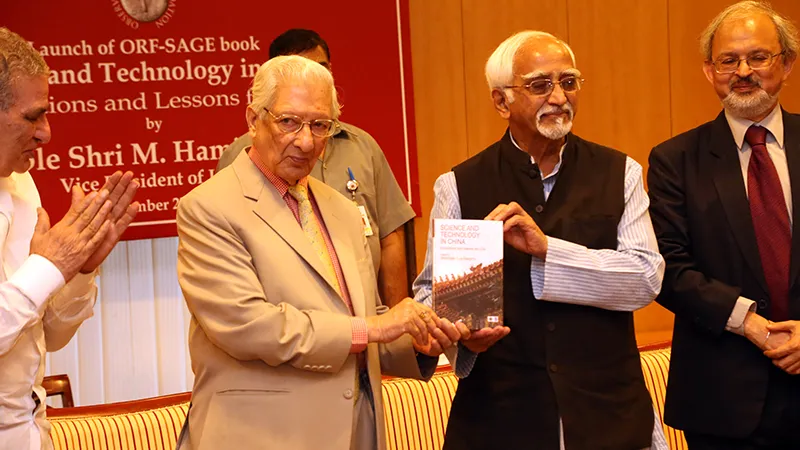-
CENTRES
Progammes & Centres
Location
Releasing ORF's latest book on China, the Vice President of India, Mr. M. Hamid Ansari, called for introspection and change of mindset to address the issue of India lagging behind China in the field of science and technology.

The Vice President of India, Mr M Hamid Ansari, has released ORF’s new publication on China -- "Science and Technology in China: Implications and Lessons for India".
The book, edited by Mr. M. Rasgotra, has papers written by the country’s top scientists, Dr. V.S. Ramamurthy, Dr. (late) V.P. Kharbanda, Dr. U.R. Rao, Dr. Roddam Narasimha, Dr. R. Rajaraman, Dr. N. Balakrishnan, Dr. Ashok Parthasarathy and Dr. Smita Purushottam.
Releasing the book at a well-attended ceremony at the VP Residential Complex on Friday (27 September), the Vice President called for introspection and change of mindset to address the issue of India lagging behind China in the field of science and technology.
The Vice President said till around 1985, India had almost the same number of PhDs in sciences, but by 1995, China went ahead.
The Vice President said while China, in the last 15-20 years, made big progress, why is it that in India young generation was not that much attracted towards research in science and technology.
He said while comparisons between India and China are natural, but various factors like uniformity in social structures, ethnicity, social values, etc should be taken into consideration as while China has uniformity, we are diverse in culture, language, ethnicity, social values, etc.
The Vice President said there is a need to have a change in mindset to improve research in science and technology and should introspect why young generation is not that attracted to this area.
He said the book, comprising papers by reputed scientists and edited by Mr M. Rasgotra, was a highly educative volume.
Mr Rasgotra, a former Foreign Secretary, said in the last 25 years, while student enrolment in science kept declining and our universities, by and large, abandoned scientific research, China made massive investments in science and technology. And it resulted in China’s meteoric rise as a great economic, military and cyber space power, he said.
He said Jawaharlal Nehru had foreseen the extraordinary role of science and technology in transforming India into a modern industrial and economic power, and despite crippling shortage of resources and other pressing problems in the early years of independence, he laid a broad and solid foundation for the growth of science and technology in India.
Mr Rasgotra noted that the Chinese leaders noted the results of Nehru’s imaginative policy to promote science and technology. In June 1954, Zhou-en-Lai said "India is economically and industrially more advanced than China". And in October 1954, even Mao grudgingly acknowledged that "India is industrially somewhat more advanced than China".
"In December 1956, Zhou-en-Lai said in a public speech in Calcutta: In the field of scientific research, we deeply feel that you (India) have made greater achievements in this field than we," Mr. Rasgotra noted. Some three decades later, Deng-Siao-Ping mumbled something to the same effect his talks Mr Rajiv Gandhi. "But, then, things began to change to India’s grave disadvantage".
Mr Rasgotra said, India, in contrast, took to easy ways of garnering wealth. Commerce, especially imports, was preferred to manufacturing even for domestic needs in critical areas. In IT and communications, for example, we skipped the hardware component," he said.
Mr Rasgotra said a nation cannot become a world power simply on its competence in software and services.
Prof. U.R. Rao, former ISRO chairman, said our earlier policy of import substitution of technical equipment actually affected country’s scientific progress. He said India, instead, should have invested more on scientific research and development. He pointed out how the investments, though initially costly, on technologies like radars have helped the country in the long run.
He said while import substitutions were the worst possible things to happen to India, the Chinese stopped this well in time.
The event was moderated by ORF Director Mr Sunjoy Joshi. He said this book, which is a delight to read, was part of the project ORF has been doing on collating and publishing of Indian understanding of contemporary Chinese discourses on how they are evolving.
He said ORF has so far published six books on China, from economy, politics, international relations and China’s role in global governance.
Mr Joshi noted that in 2009, when the world was facing financial crisis, China earmarked 500 billion dollars on R & D and green energy. And the results are evident today.
The essays in the 255-page book focus on China’s nuclear programme, space technology, aviation, aeronautics, IT and industrial development. The writers conclude that India has to carefully tailor its own military strategy and diplomacy in the Asian region to greater effect with better harnessing and utilisation of its strengths in science and technology.
They point out that the reforms, policy initiatives and strategies in multiple sectors initiated by China contain crucial lessons and one key message for India - the need to pursue a coordinated and single-minded strategy to achieve goals.
The views expressed above belong to the author(s). ORF research and analyses now available on Telegram! Click here to access our curated content — blogs, longforms and interviews.